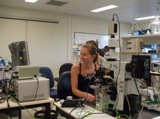Physiology Graduate Students
 Physiology Graduate Students
Physiology Graduate Students
Some of our current graduate students. Physiology captured my interest as an undergrad because it seemed to integrate together all the “bits and pieces” you pick up in other subjects; you get to study how the whole system works and interacts and look at the “Big Picture”. The Physiology Department here at Auckland University is a wonderful place to be a post-grad student – cutting-edge research, a supportive and friendly environment, great people and the best morning teas!
Physiology captured my interest as an undergrad because it seemed to integrate together all the “bits and pieces” you pick up in other subjects; you get to study how the whole system works and interacts and look at the “Big Picture”. The Physiology Department here at Auckland University is a wonderful place to be a post-grad student – cutting-edge research, a supportive and friendly environment, great people and the best morning teas!
 Physiology captured my attention right from my first 2nd year lectures in the subject, and hasn't let me go since. The thing that first attracted me to physiology was that it revealed the amazing, intimate relationships between form and function found in living things: Why do neurons have complex shapes, and why do heart valves look the way they do? Because these are highly specialised adaptations that enable them to fulfill a very precise function. I've always been interested in the discovering how brains work: we all have them, they define the very fabric of who we are, and yet we have very little idea how they work. I'm especially interested in how information is represented in the brain, and how complex behaviours arise from the interconnectedness of networks of neurons. Of the various approaches to studying the brain, physiology most appeals to me because of the way it is concerned with asking questions that can be answered objectively using quantitative methods.
Physiology captured my attention right from my first 2nd year lectures in the subject, and hasn't let me go since. The thing that first attracted me to physiology was that it revealed the amazing, intimate relationships between form and function found in living things: Why do neurons have complex shapes, and why do heart valves look the way they do? Because these are highly specialised adaptations that enable them to fulfill a very precise function. I've always been interested in the discovering how brains work: we all have them, they define the very fabric of who we are, and yet we have very little idea how they work. I'm especially interested in how information is represented in the brain, and how complex behaviours arise from the interconnectedness of networks of neurons. Of the various approaches to studying the brain, physiology most appeals to me because of the way it is concerned with asking questions that can be answered objectively using quantitative methods.
 I am a PhD student in Dr Johanna Montgomery’s Synapse Function Lab. My primary research interests are synapse plasticity and neurogenesis in the hippocampus. Since I have been in the lab I have been investigating plasticity-induced regulation of Group I metabotropic glutamate receptors (mGluR1 and mGluR5) in cultured hippocampal neurons. Specifically, I investigated whether these receptors are regulated by induction of long term potentiation (LTP) and long term depression (LTD). My future thesis work will address the functional incorporation of newborn hippocampal neurons into existing neuronal networks and the role Group I mGluRs play in the incorporation of these newborn neurons.
I am a PhD student in Dr Johanna Montgomery’s Synapse Function Lab. My primary research interests are synapse plasticity and neurogenesis in the hippocampus. Since I have been in the lab I have been investigating plasticity-induced regulation of Group I metabotropic glutamate receptors (mGluR1 and mGluR5) in cultured hippocampal neurons. Specifically, I investigated whether these receptors are regulated by induction of long term potentiation (LTP) and long term depression (LTD). My future thesis work will address the functional incorporation of newborn hippocampal neurons into existing neuronal networks and the role Group I mGluRs play in the incorporation of these newborn neurons.
Isuru Dilshan
Physiology is (most of the time) about investigating relevant questions (not about some random protein that somebody discovered when looking through a cDNA library of some microbial genome). It integrates all types of science and it's never boring (with certain exceptions). In physiology, you are forced to answer the questions in a logical way. This also matures your writing, and the ability to critically look at other people's work. At the end of the day you become a better researcher, a better writer (more capable of getting scholarships and funding), and stronger in dealing with the stresses of scientific research. The department of physiology is the biggest earner for FMHS (unconfirmed source), and the research that is being done here is absolutely worth the money it is being paid. Most research groups that the students are exposed to, via courses like MEDSCI 205, are world-class scientists with a lot of respect worldwide.
 As a stage II student I found the only paper that really captured my interest was Physiology. It challenged me in a way my other courses did not because you have to think things through and form a real understanding of processes and principles rather than parrot learning things. Also, the primary focus in Physiology is FUNCTION. We use a wide variety of tools - from molecular biology to electrophysiology - and constantly aim to answer the question – “How does this affect function in a whole organism?” For me that needs to be the primary focus when I’m doing my research.
As a stage II student I found the only paper that really captured my interest was Physiology. It challenged me in a way my other courses did not because you have to think things through and form a real understanding of processes and principles rather than parrot learning things. Also, the primary focus in Physiology is FUNCTION. We use a wide variety of tools - from molecular biology to electrophysiology - and constantly aim to answer the question – “How does this affect function in a whole organism?” For me that needs to be the primary focus when I’m doing my research.
| « Turnitin | Useful Links » |




